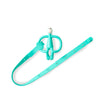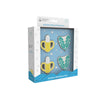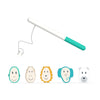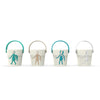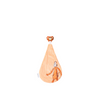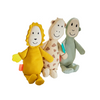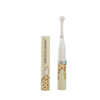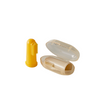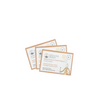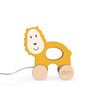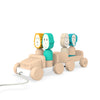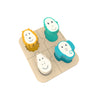How to Introduce a Dog or Puppy to Your New Baby
Preparing for the arrival of a baby is always an exciting time with lots of things to do, organise and look forward to. If you have a pet dog, this prep will also involve helping your furry friend get ready to meet the new addition to your family!
Making sure you take at least 6 months to get your dog ready for the arrival of a baby will help to keep disruption to a minimum. This goes for your furry friend AND for you! No matter how old, young, friendly or easy going, no matter the breed or size of your dog, you should never assume that you know how your dog will behave with your baby.
In a dogs world, they enter into a family at the bottom of the pack and over a period of time, find their (what they feel is their rightful) position. A baby enters your family pack near the top, which may usurp your dog’s assumed position and be very confusing or upsetting for them. Your dog might seek to (rightfully, as they see it) reassert their position within the household by displaying unwelcome or aggressive behaviour.
Puppies can be easier to train around your baby for this very reason. They will already believe themselves to be at the bottom of the rung, and with no prior experience of human family life - more readily accept that their place is below the baby.
To write this article, we sought advice from trained dog behaviourist, Ross McCarthy and the Dog Safety Education Executive.
Before you begin to prepare your dog, the Dog Safety Education Executive recommends that you ask yourself these key questions:
- Will the dog be allowed access to the same areas in the house it has been up until now?
- Is your dog already used to babies and small children, if not how can you condition your dog?
- Does your dog react to noise or sensitive to sudden high pitched sounds?
- Is the dog allowed on the sofa or on your bed, what will you do if the baby is laid there?
- Will you have the same amount of time and energy for your dog?
- Will you have an increase in visitors?
- How will you keep your baby safe from the dog when changing the nappy on the floor?
- Will your dog leave the room on command immediately and reliably?
- Will you be able to manage walking the dog and pushing the pram or buggy at the same time?
- Is there a safe place for your dog to go if either of you need space?
- Is your dog obedient and can you ask it to go on its bed and stay there?
- How will you deal with visitors when they arrive, talking in the same voice tones to the baby as the dog is used to?
- How will your dog cope when you have less time to spend with it?
- Will your dog release any object on command?
- How will the dog behave with a plethora of new toys about the place?
- Will your dog move if someone walks (or crawls) towards it?
If your dog is extremely well behaved and reacts positively to every command, you might find it much easier to prepare and train your dog. However, if your canine pet has the run of the household, this will probably take a little longer!

Can a newborn be around a dog?
You should never, ever leave your baby alone with your dog or anyone else’s. No matter how well you think they get on, you must always be there to supervise.
Are dogs protective of babies?
If your dog is naturally protective of you and your family, there is a chance they may also be protective of a baby. In fact, some dogs can become overprotective, which can be hard if your baby is getting lots of visitors!
Don’t assume that your dog will be protective. If they are looking eagerly or interestedly at a visitor who has come over to see your baby, this may just be because they are waiting for the time when attention will be bestowed upon them rather than for any concern over the baby.
Can dogs sense babies?
A dog has very finely developed senses and a human baby won’t smell like a puppy, nor will it smell like an adult human. A baby’s smell, the way it moves and the noises it makes can sound very confusing to a dog. The smells, moves and noises can sound both like a potential threat, an exciting new toy or even potential prey to your confused canine.
Dogs do not have a concept or natural understanding of what pregnancy or a human baby is. Your dog is not a child, and despite how clever they may be, you can not sit a dog down and explain these things to them or expect them to understand.
Is it ok for a dog to lick a baby’s face?
A dog will lick a baby’s face for a variety of reasons, from exploring and understanding what the baby is, to asserting its dominance over the baby or to trying to play. It might look cute, but dogs mouths carry lots of germs that can be passed onto people! This means, apart from immediate safety reasons, it’s not a good ideal to let your pet lick your baby’s face.
Do dogs get jealous?
Yes. Dogs are highly social pack animals and are sensitive to hierarchy. If your dog is usually treated like the baby of the household, with lots of fuss, love and attention - they may not understand why you’ve suddenly got less time for them.
Having a baby inevitably means that you won’t be able to pay your dog as much attention as before so try to get them used to this before the baby arrives. Ignoring them at meal times and preventing them from jumping on the bed and sofas for constant cuddling will prepare them for when they need to wait their turn.
The advice is not to lavish praise and attention on your dog only when the baby is in bed, however, as they will start to think that life is better when the baby isn’t around!
What happens when my baby gets older?
When your baby becomes a toddler and can crawl or move around a room independently of you, this is another big step for a dog to get used to and you should prepare accordingly.
If you need more information about how to prepare your dog for a baby in the house, we highly recommend you read this article by the Dog Safety Education Executive.








